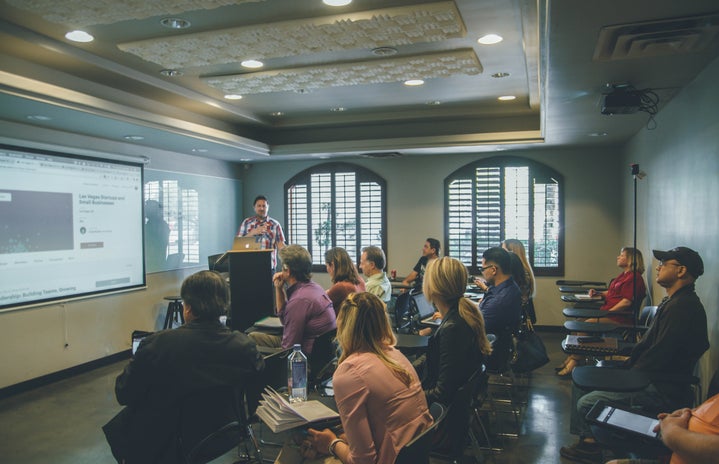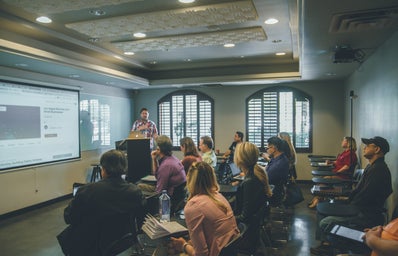By the time I graduate I will have only had 4 quarters in which I actually had in-person classes but, even in online classes you could still get a feel for the professor. Thankfully my first couple quarters into the pandemic, I had really understanding and accommodating professors, which I thought was because I was a humanities/social science major. But, as I’ve noticed in the return to campus, despite most of the classes I take discussing themes like classism, systemic inequality, ableism and more, it seems like white professors, and sometimes even BIPOC professors, don’t seem to notice how they perpetuate these within their classrooms.
UW has a reputation of being a leader in diversity; whether or not that’s true could easily be a whole article on its own. But, because it’s publicized in this way, one can assume that faculty and staff are also what one might think of as “progressive” or even radical, considering being progressive can sometimes lead to going further down the road and wanting to change the system as a whole. But, as a lower-class, BIPOC student with immigrant parents, I can’t tell you the number of times I have felt uncomfortable in classes.
I took an immigration and ethnicity class that was primarily composed of children of immigrants or immigrants themselves. In that class, the professor regularly used vocabulary like “illegal alien or entry” despite many of us speaking out about insensitivity and dehumanizing nature of these words. I took this course expecting to learn a bit more about the theories of migration and immigration in general, as I only know stuff about it because of my lived experience as a child of immigrants. Instead, I found myself constantly becoming frustrated that my professor himself was taking part in the dialogue of reducing immigrants to their economic contributions.
I lost count of the times I felt uncomfortable in that class and was incredibly glad it was remote, so I didn’t have to hide my facial expressions because I don’t think I could’ve. I remember speaking to my groupmates about feeling uncomfortable thinking it was just me and was both relieved and disappointed to hear many students felt the same way. The professor talked about their research subject being primarily about immigrants and it was disheartening to see that researching migrants was purely something they saw as beneficial for them. Instead of using their research to speak out about the cruel treatment and dehumanization immigrants face in the US, it seems as though they are more concerned about their progress in the research field.
Unfortunately, this wasn’t the only class I’ve felt uncomfortable in as a BIPOC student. A professor I had once stated on the first day of class how they were “committed to being anti-racist” and essentially against all the “-isms.” Despite seemingly announcing their opposition to things like ableism, classism, racism, etc., I can’t say that professor really followed through on their statement. On the first day of class, we were told that no electronics were allowed in class and that those who used them for notetaking would have to purchase a notebook for the course. I take my notes by hand already but, the fact that electronics were banned completely from being in use during class was off putting to me for several reasons.
Not only do students already spend so much money on these electronics to use them for their studies, but this also assumes that everyone can write for almost 2 hours straight. Some may have a disability that makes it so they have to take notes on an electronic device, otherwise they may not be able to take accurate and useful notes which would then hinder their education. I’m sure the professor would’ve allowed for students to use a laptop or other electronic device if it was disability related but the fact that there was an actual class policy making the classroom that much less accessible, was disappointing to hear from a professor who claimed they’re a rather radical scholar.
Since I’ve switched to the Spanish pronunciation of my name, I’ve had plenty of professors struggle a bit before ultimately getting the hang of it but, one professor I had really took the cake on handling it the worst. They would pronounce my name the English way and I would politely correct them each time. Eventually, they just stopped saying my name altogether. Instead, when I raised my hand to speak, they would just point at me. They did, however, get other BIPOC students’ names correct so at least that was a bonus. But they also insist on no electronics in the classroom which means we have to bring paper copies. In my opinion, assuming every student has access to a printer, is a bit out of touch given Seattle housing prices and the fact that we’re in the middle of an inflation.
While I’ve had plenty of professors who’ve left a sour taste in my mouth, I’ve also had a lot of incredibly amazing ones. I’ve had professors who are incredibly understanding and encouraging. I’ve had professors who have pushed me to apply myself in my studies and my personal life and have been an incredible support. So while there are some professors who are quite literally the bane of my existence, there are plenty of professors that definitely outweigh the bad ones. That being said I do wish professors actually practiced what the preached and were more aware of the environment they’re creating in the classroom.


